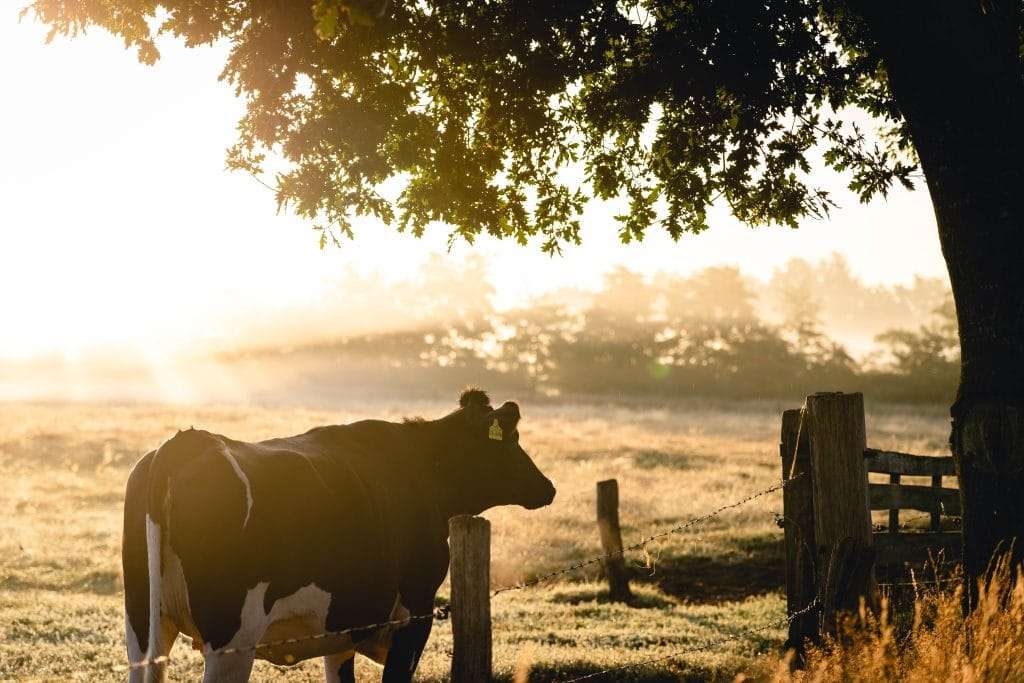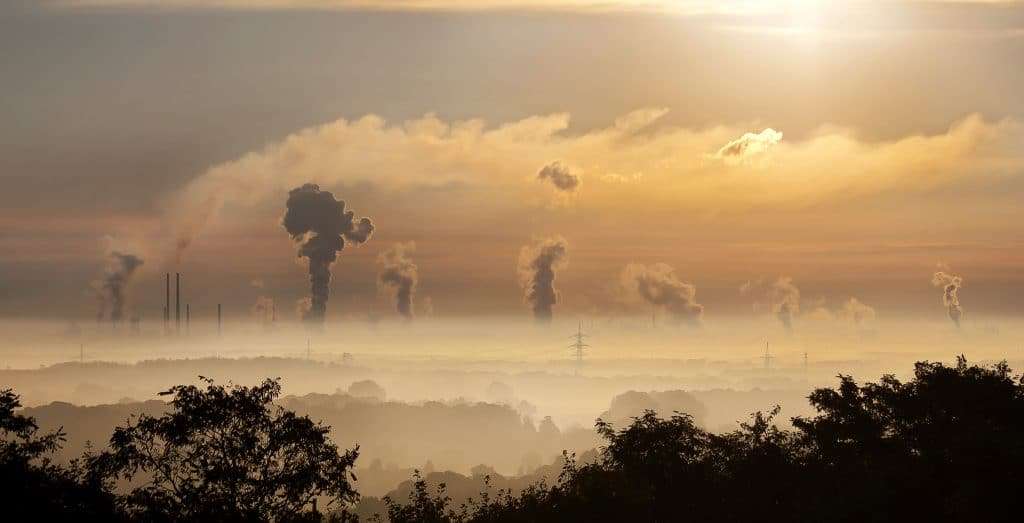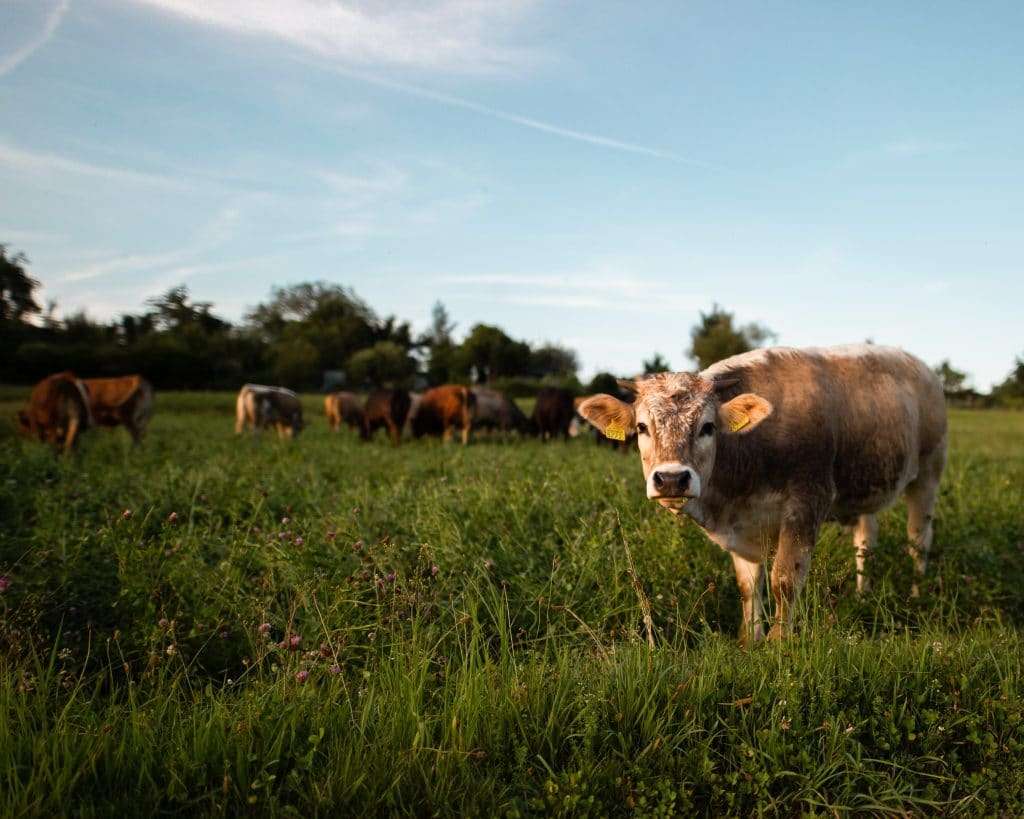New research from Impossible Foods founder says a shift away from animal agriculture over the next 15 years is a critical key to reversing climate change.
Reducing meat consumption has long been touted as a means to fight climate change. Animal agriculture accounts for more than 15 percent of all emissions, but some experts put it even higher. Now, new data published in the journal PLOS Climate underscores the need to shift away from raising animals for food as the climate crisis quite literally heats the planet up.
The study, a collaboration between Michael Eisen, professor of molecular and cell biology at the University of California, Berkeley, and Patrick Brown, professor emeritus of biochemistry at Stanford University and the CEO of vegan meat brand Impossible Foods Inc., looks at the climate impact of animals raised for food. Eisen is also a consultant for Impossible Foods, which sells its vegan meat in the fast-food chain Burger King as well as scores of restaurants and supermarkets across the U.S. and around the world.

Brown has not been shy about his mission to displace animal meat from the food supply chain. He’s made bold projections, including a claim that there will no longer be a global animal-agriculture industry by 2035.
The new data supports that assertion, at least, in theory. According to Brown, it’s no longer a question of whether or not we should move away from animal products, but a question of whether or not we’ll do it in time.
Using a simple climate model, Eisen and Brown said they looked at the combined impact of eliminating animal agriculture emissions along with restoring 30 percent of the planet’s land to native vegetation—roughly the same amount of space currently devoted to raising livestock.
A new climate model
What the models showed, according to the researchers, was significant: a drop in both methane and nitrous oxide levels, and the conversion of 800 billion tons of carbon dioxide into “forest, grassland, and soil biomass.” They say it’s the equivalent of a 68 percent decrease in global CO2 emissions. The researchers did not look at the impact of the global fishing industry, which is also a large emissions producer. These findings only reflect land-based agriculture.
According to the researchers, most studies on animal agriculture’s role in climate change have looked solely at methane and nitrous oxide; the former is produced by manure primarily, and the latter from fertilizers used on feed crops. Most of the CO2 comes by way of raising and transporting meat.
“Everybody knows that methane is a problem. Everybody knows that livestock contribute to global warming in some way,” Eisen said in a statement accompanying the research. “But animal ag contributes to global warming in two ways: It contributes via emissions and contributes because that land would otherwise be holding carbon. Most analyses only look at one of those things.”
He says the work shows ending animal agriculture has the unique potential to “significantly reduce atmospheric levels of all three major greenhouse gases, which, because we have dithered in responding to the climate crisis, is now necessary to avert climate catastrophe.”

“Eliminating animal agriculture would have a quicker and greater impact over the next 20 to 50 years, the critical window for avoiding climate catastrophe, and thus should be at the top of the list of potential climate solutions,” Brown said.
“There is,” he added, “an enormous, previously unrecognized opportunity to sharply bend the trajectory of climate change within a couple of decades, with multiple additional environmental and public health benefits, and minimal economic disruption.”
The research is not the first to look at the impacts of reducing animal agriculture. Scores of studies, including some commissioned by the United Nations, have underscored the urgent need to reduce global animal consumption.
Despite the science, sales of animal products, particularly meat, continue to rise. Valued at $838 billion in 2020, the global meat industry is expected to surpass $1 trillion in sales by 2025.
Animal agriculture is linked to more than just emissions; it’s also a driver of biodiversity loss, water pollution, and overuse of natural resources, among a host of other issues. Reducing animal consumption would also decrease the global health crisis linked to air quality—more than 3 million people die a year from air pollution-related illnesses.
Millions also die from diet-related illnesses linked to meat and dairy consumption—an endemic that’s also putting pressure on the climate. Globally, the health care industry produces nearly 5 percent of all emissions. That’s a number that likely increased over the last two years as the Covid pandemic pushed hospitals around the world past capabilities and capacity. Pandemics, too, like Covid, are byproducts of the meat and dairy industries.
I’ve been saying for years that replacing livestock in the global food system would turn back the clock on climate change.
-Patrick Brown, CEO and founder Impossible Foods
It’s been more than a decade since Brown founded Impossible Foods. Both Eisen and Brown are vegan, a shift they made after discovering the impact animal agriculture had on the planet.

“My awareness of the potential impact was a major motivation for launching Impossible Foods,” Brown said. “In fact, I’ve been saying for years that replacing livestock in the global food system would turn back the clock on climate change. But although I knew that this conclusion was directionally correct, the environment and policy community would accept it only if we did this rigorous modeling that [Eisen] and I did.”
Both Eisen and Brown say the benefits of phasing out animal products are so notable that it should be as high of a priority as the shift away from fossil fuels. As President Biden and other world leaders embrace efforts like electric vehicles as a solution, there’s little in the way of regulations or subsidies to help alternative protein industries thrive.
The researchers say that as much as 33 percent of all CO2 produced by animal agriculture is the result of land clearing for grazing and feed production.
“What hadn’t been recognized is the much more impactful potential to unlock negative emissions by eliminating that industry,” Brown said.
Countdown to a climate disaster
Brown and Eisen say a 15-year phaseout of animal agriculture would greatly help to reduce emissions and keep the planet well under the 1.5°C Paris Agreement temperature target aimed at avoiding catastrophic climate-triggered events.
“A 15-year phaseout is not unrealistic — a lot of things happen on that timeframe,” Eisen said. “We went from having no cellphones to cellphones being ubiquitous in less time than that. It’s not that we’re saying we’re going to get rid of animal ag in the next 15 years, though that’s sort of the mission for Impossible Foods, but that is something we could do.”
If adopted in earnest, Eisen and Brown say the move would decrease 33 percent of all methane and 66 percent of nitrous oxide emissions, allowing for a new equilibrium in the atmosphere.
“I think this is a kind of Pearl Harbor moment for science. The climate of the planet is under a bigger threat now than it’s ever been in history, and to the extent that scientists can find ways to contribute, I think it’s really incumbent upon us to do so,” Eisen said.

The researchers point out that nearly half a billion people already live on plant-based diets. They say existing crops could easily replace calories, protein, and fat from animal products. This would require less land and water, and produce fewer greenhouse gases. It would also decrease the impact on biodiversity, the researchers say.
“[T]here’s compelling evidence that animal agriculture can be replaced without requiring meat lovers to compromise on nutrition or any of the sensory pleasures they love,” Brown said.
“What we really did in the paper was try to formalize what it would mean to get rid of animal agriculture without making it too complicated,” Eisen said. “There’s a lot of uncertainty, there are a lot of unknowns, but I think probably the biggest uncertainty is whether people will look at this potential and act on it as a society.”
“I’m hoping that others, including entrepreneurs, scientists and global policymakers, will recognize that this is the most important opportunity humanity has to reverse the trajectory of climate change, and seize it,” Brown said.


